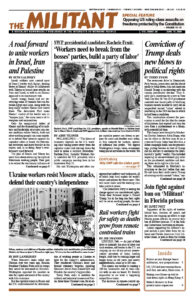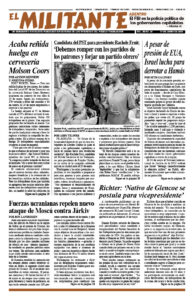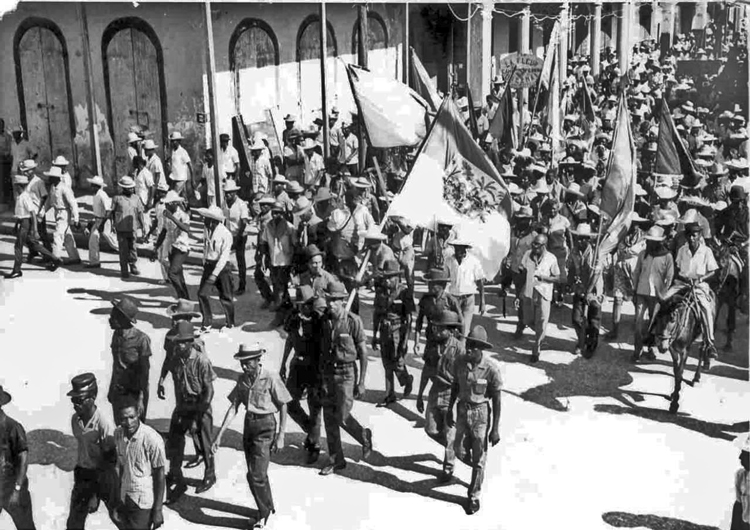MIAMI — The Joseph Biden administration seized on the May 23 killing of three Christian missionaries working in Haiti — two Americans and a Haitian — to call for an “expedited deployment” of a multinational military force to fight powerful gangs who control large parts of the country’s capital.
The looming U.N.-backed deployment of some 2,500 Kenyan-led foreign forces has been in the works since October as Washington seeks to put into place yet another U.S. imperialist-led intervention in the neighboring Caribbean nation.
“There is a lot going on in this hemisphere. And we’re in a situation where we want to do all we can without us looking like America once again is stepping over, deciding this is what must be done,” Biden said May 23 at a White House press conference with William Ruto, president of Kenya. In addition to largely financing the military intervention, Washington will provide intelligence support and equipment.
In the meantime, gangs are intensifying attacks to better their positions before the deployment. Since Feb. 29, armed gangs have targeted police stations and vandalized and burned dozens of hospitals, schools and critical infrastructure. The violence has forced at least 90,000 Haitians to seek refuge in schoolyards and public plazas in the capital and led to the deaths and injuries of more than 2,500.
In the past 30 years, military invasions of Haiti have been carried out both under the banner of the U.N. and directly by U.S. troops. They have installed puppet governments through which U.S., French, and Canadian imperialism exercised control over the country. These military interventions have visited on Haitians cholera, rape and thousands of casualties by U.N. forces.
During Washington’s first imperialist intervention the administration of President Woodrow Wilson sent U.S. Marines to Port-au-Prince in 1914 to take $500,000 — the equivalent of $15 million today — from the Haitian National Bank to New York, giving the U.S. rulers control over the bank. The following year Washington invaded Haiti and occupied it for 20 years.
What followed were decades of naked imperialist exploitation carried out in collaboration with a string of dictators. These regimes relied on paramilitary gangs to stifle their rivals and suppress struggles by working people in city and countryside. This became the face of capitalist domination in Haiti.
During the rule of the Francois and Jean-Claude Duvalier family — from 1957 to 1986 — the regime used the notorious paramilitary Tonton Macoutes to dispose of its enemies and terrorize working people. They were backed by Washington.
Haitian toilers rise up
Growing working-class resistance to the Duvaliers’ dictatorship in 1984 led to a broad struggle involving tens of thousands in street mobilizations and strikes across the country. Their struggle brought down one of the most brutal dictatorships in Latin America, building the confidence of working people to fight for political rights and better working and living conditions.
Jean-Bertrand Aristide, an outspoken opponent of the tyranny, emerged as the main leader of this rebellion. He was elected president on the hopes of working people that the new government would improve their conditions of life.
In 1991, rightist military officers, backed by capitalist forces both in Haiti and abroad, toppled Aristide. He turned to Washington with illusions the U.S. rulers would help. But he made a deal with the devil. Washington did help Aristide retake power, on the bayonets of 20,000 invading U.S. troops. The price was increased subordination to Washington’s dictates.
The reinstalled Aristide government willingly carried out Wall Street’s demands to open up Haiti to greater imperialist penetration, relying more and more on thuggish methods against its capitalist opponents. His party’s leaders enriched themselves amid flourishing corruption, becoming more and more distanced from the realities of life of the Haitian masses.
Imperialist interference
“The worst period in Haiti in my lifetime was when Aristide was brought back,” Max Noel, today a warehouse worker in Miami, told the Militant. “When the United States invaded they changed everything so they could get rich off of us. Haiti’s resources were stolen — even historical landmarks, like an old castle in my hometown — were looted, and all the bronze statues and cannons were stolen. Land was sold off cheap to factory owners. The pay and conditions in those factories were horrible.”
Aristide was elected a second time, and then toppled again in 2004. Following his removal, the U.N. Security Council assembled an occupation force to establish a new regime. At its height, the U.N. force grew to as many as 13,000 members.
U.N. occupation forces and “aid” agencies were there during the devastating 2010 earthquake, which killed over 300,000 people. At least 10,000 died of cholera, which was caused by poor sanitation at a U.N. base.
The naked corruption led to a growing number of clashes that left hundreds of civilians dead, and numerous cases of “peacekeepers” linked to a child sexual exploitation ring and the rape of women. Criminal courts never charged them formally. In 2017, the U.S. rulers decided to remove their mission from the country. Now they’re looking to come back.
The imposition of puppet governments by imperialist interests, factional war between Haitian ruling circles and the emergence of organized criminal gangs in the last decade has created a vacuum of power. “Given the number of weapons present in this country any serious government will have to get along with the armed groups,” notorious gang leader Jimmy Cherizier told France 24 News on May 27.
As struggles by working people worldwide deepen under the impact of today’s capitalist crisis, the fighting traditions of Haitian toilers will rise again.
Róger Calero contributed to this article.


